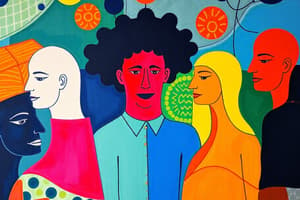Podcast
Questions and Answers
What does the term 'social structures' refer to?
What does the term 'social structures' refer to?
- The patterned social arrangements that influence individual actions. (correct)
- The reactions of individuals to social norms.
- The historical context that influences cultural norms.
- The specific laws governing behavior in society.
Which of the following best describes cultural norms?
Which of the following best describes cultural norms?
- They are the unwritten rules that guide behavior. (correct)
- They dictate behavior in society without exception.
- They are identical across all cultures and societies.
- They are always strictly enforced by laws.
Which statement about deviance is true?
Which statement about deviance is true?
- Deviance can be functional by challenging the status quo. (correct)
- Deviance is only associated with criminal behavior.
- Deviance always leads to negative consequences.
- Deviance is the same across all cultures.
In the context of socialization, what is primary socialization?
In the context of socialization, what is primary socialization?
What is a primary concern of social inequality?
What is a primary concern of social inequality?
Which option best exemplifies secondary socialization?
Which option best exemplifies secondary socialization?
How do social structures affect individual behavior?
How do social structures affect individual behavior?
What role do cultural norms play in society?
What role do cultural norms play in society?
Flashcards
Sociology
Sociology
The systematic study of society, social institutions, relationships, interaction, and culture.
Social Structures
Social Structures
Patterned social arrangements shaping individual actions, influencing opportunities.
Cultural Norms
Cultural Norms
Unwritten rules defining acceptable/unacceptable behavior in a society.
Deviance
Deviance
Signup and view all the flashcards
Socialization
Socialization
Signup and view all the flashcards
Social Inequality
Social Inequality
Signup and view all the flashcards
Key Figures in Sociology
Key Figures in Sociology
Signup and view all the flashcards
Sociological Perspectives
Sociological Perspectives
Signup and view all the flashcards
Study Notes
Sociology
- Sociology is the systematic study of society, social institutions, social relationships, social interaction, and cultural phenomena.
- It examines how social structures and cultural norms shape individual behavior and societal outcomes.
- Key figures in sociology include Émile Durkheim, Karl Marx, and Max Weber.
- Key sociological perspectives include functionalism, conflict theory, and symbolic interactionism.
Social Structures
- Social structures are the patterned social arrangements in society that are both emergent from and determinant of the actions of the individuals within them.
- Examples of social structures include families, education systems, governments, and economic systems.
- Social structures influence individual opportunities and life chances.
- Social structures are often invisible, but their effects are observable in social patterns and inequalities.
Cultural Norms
- Cultural norms are the unwritten rules that govern behavior within a society.
- These rules define what is considered acceptable and unacceptable, appropriate and inappropriate.
- Cultural norms vary across societies and change over time.
- Some cultural norms are explicit (e.g., laws) while others are implicit (e.g., customs).
- Norms shape individual behavior and expectations.
- They guide interactions and promote social order.
Deviance
- Deviance refers to behaviors or characteristics that are viewed by segments of a society as violating or going against socially established norms.
- Deviance is relative to cultural norms.
- Deviance can be criminal, like breaking the law, or non-criminal, like violating norms of etiquette.
- Societal responses to deviance vary.
- Deviance can be functional, as it challenges the status quo and can generate social change.
Socialization
- Socialization is the process by which individuals learn and internalize the values, beliefs, norms, and behaviors of their culture.
- Primary socialization occurs during childhood and is usually with family members.
- Secondary socialization occurs outside the family and involves institutions such as schools, peer groups, and workplaces.
- Agents of socialization include family, peers, schools, media, religion, and the workplace.
- Socialization shapes individual identity and behavior.
Inequality
- Social inequality refers to the unequal distribution of resources, opportunities, and social rewards in society.
- Inequality can be based on various factors, including race, ethnicity, gender, class, and sexual orientation.
- Inequality leads to disparities in access to education, healthcare, employment, and other social benefits.
- Social inequalities can perpetuate themselves across generations.
- Inequality can create significant social problems and disparities.
Studying That Suits You
Use AI to generate personalized quizzes and flashcards to suit your learning preferences.




